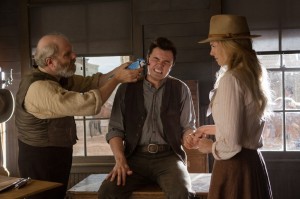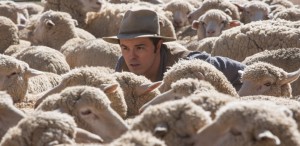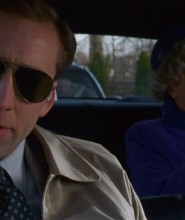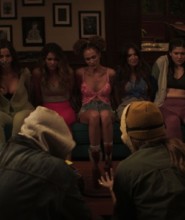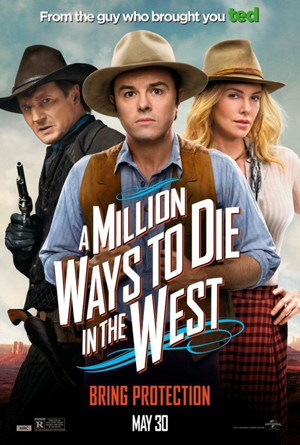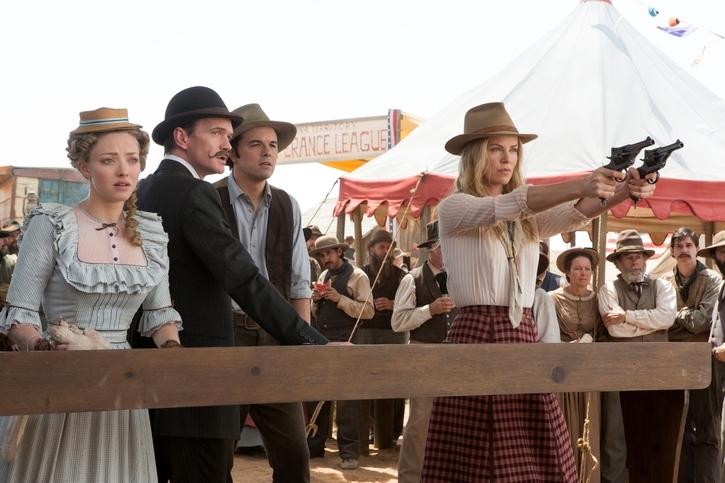
A Million Ways to Die in the West (2014)
by Sara Michelle Fetters - May 30th, 2014 - Movie Reviews
Western Comedy Million Ways Fires Too Many Blanks
Albert Stark (Seth MacFarlane) is a sheep farmer barely squeaking by in the Arizona frontier town of Old Stump. After fast-talking his way out of a main street gunfight, his longtime girlfriend Louise (Amanda Seyfried) unceremoniously breaks up with him for being a coward, taking up with the local mustachery merchant Foy (Neil Patrick Harris) instead. Things are looking down, and with so many ways to get killed in the Old West, dying from a broken heart is as good a way as any to get yourself laid six feet beneath the cold, hard ground.
Everything changes when Anna (Charlize Theron) gallops into town. Beautiful, smart and handy with a six-gun, for whatever reason she’s taken with Albert, and wants to see him discover the confident and decisive person lurking within. She even convinces him to enter into a gunfight with the flippant Foy, certain that with her expert tutelage he’ll be able to hold his own and show everyone just what kind of man he truly is.
But Anna has a secret, a truth she’s afraid to admit to anyone, just on the off chance the knowledge will get them killed. See, she’s the wife of notorious outlaw and gunslinger, Clinch Leatherwood (Liam Neeson), and no amount of training and practice will ever make a guy, like the good-hearted Albert, ready to stand face-to-face with the bloodthirsty likes of him.
Directed and co-written by MacFarlane, A Million Ways to Die in the West isn’t so much this generation’s attempt to recall the glory days of Mel Brooks’ immortal Blazing Saddles as it is an homage to the riches of Hollywood’s Western tradition. The Ted filmmaker’s second theatrical effort has more in common with 1945’s Gary Cooper classic Along Came Jones than it does with that talking teddy bear comedy or with his still popular animated television series “Family Guy,” the film a story-driven sagebrush saga sprinkled with outlandish comedic bits instead of a laugh-filled, anything-goes free-for-all.
All of which is well and good, especially early on, MacFarlane developing his characters and the world they inhabit nicely. There are deft bits of inspiration pulled from the works of Howard Hawks, John Ford, John Sturges and Anthony Mann, the glory days of John Wayne, James Stewart and the aforementioned Cooper, along with so many others hinted at throughout. Stark is a sublime everyman, and even though his worldly point of view is admittedly far too contemporary in nature, the way he looks at things and reacts to what’s occurring fits in nicely with the late 19th century frontier domain MacFarlane has constructed.
Problem is, the movie just isn’t very funny. Sure there are chuckles here and there, some of the left field unexpected stuff particularly so at times, but overall as a comedy the movie just doesn’t have much in the way of heat, little that keeps momentum percolating. And, it’s horribly paced, MacFarlane losing his way on numerous occasions, allowing scenes to go on for an almost interminable length, forcing the mind to wander in directions it otherwise shouldn’t be going in. The climactic section, when Clinch learns of Albert’s existence and Anna’s affection for him, takes forever to play out, ultimately culminating with a humdrum lackadaisical flourish that’s as forgettable as it is benign.
It does not help that MacFarlane often loses sight of just what type of story it is he’s trying to tell. He spends so much time building the unbreakable friendship between Albert and Edward (Giovanni Ribisi), the town’s sexually clueless shoe repairman (who happens to be married to the town’s most popular whore, Ruth (Sarah Silverman), to only forget about the it for long portions of the narrative. As for Louise and Foy, they’re barely interesting, almost an invisible part of the proceedings, MacFarlane wasting both Seyfried and especially Harris, doing little of note with either of them, save a sequence of extreme flatulence (a notable node to Blazing Saddles) that’s more disgusting than it is hysterical.
His ace in the hole, however, is Theron. She’s a sparkling gem in a sea of triviality, bringing life and heart to a film that barely flirts with either property. The Oscar-winning actress is fully invested, finding depth and shadings within Anna, all of which make her an almost perfect Western heroine. She finds humor in the simplest things, beauty at the oddest of moments, painting a three-dimensional portrait easy to relate to and even simpler to get excited about.
More than this, though, I truly do appreciate MacFarlane’s obvious affinity and passion for the Western genre. He uses his locations splendidly, allowing cinematographer Michael Barrett’s (About Last Night) camera to mine for every detail and revel in every rock formation and canyon. Joel McNeely’s (Holes) rollicking score is a flawless mixture of themes and ideas from notable classics ranging from How the West Was Won, to The Magnificent Seven, to Silverado, every note adding just the right gradation to whatever is taking place upon the screen.
Make no mistake, however; none of these positives add up to near enough. A Million Ways to Die in the West is a misbegotten, unfocused attempt at Western comedy that never gels like it potentially could have. I appreciate MacFarlane’s bid to broaden his horizons, to step outside his comfort zone, if only just a tiny bit; but unfortunately, that isn’t enough to make his latest a success. It misses the mark, shooting way too many blanks, hitting the target so infrequently it’s almost as if the film itself isn’t even trying.
Film Rating: 2 out of 4
Review reprinted courtesy of the SGN in Seattle


